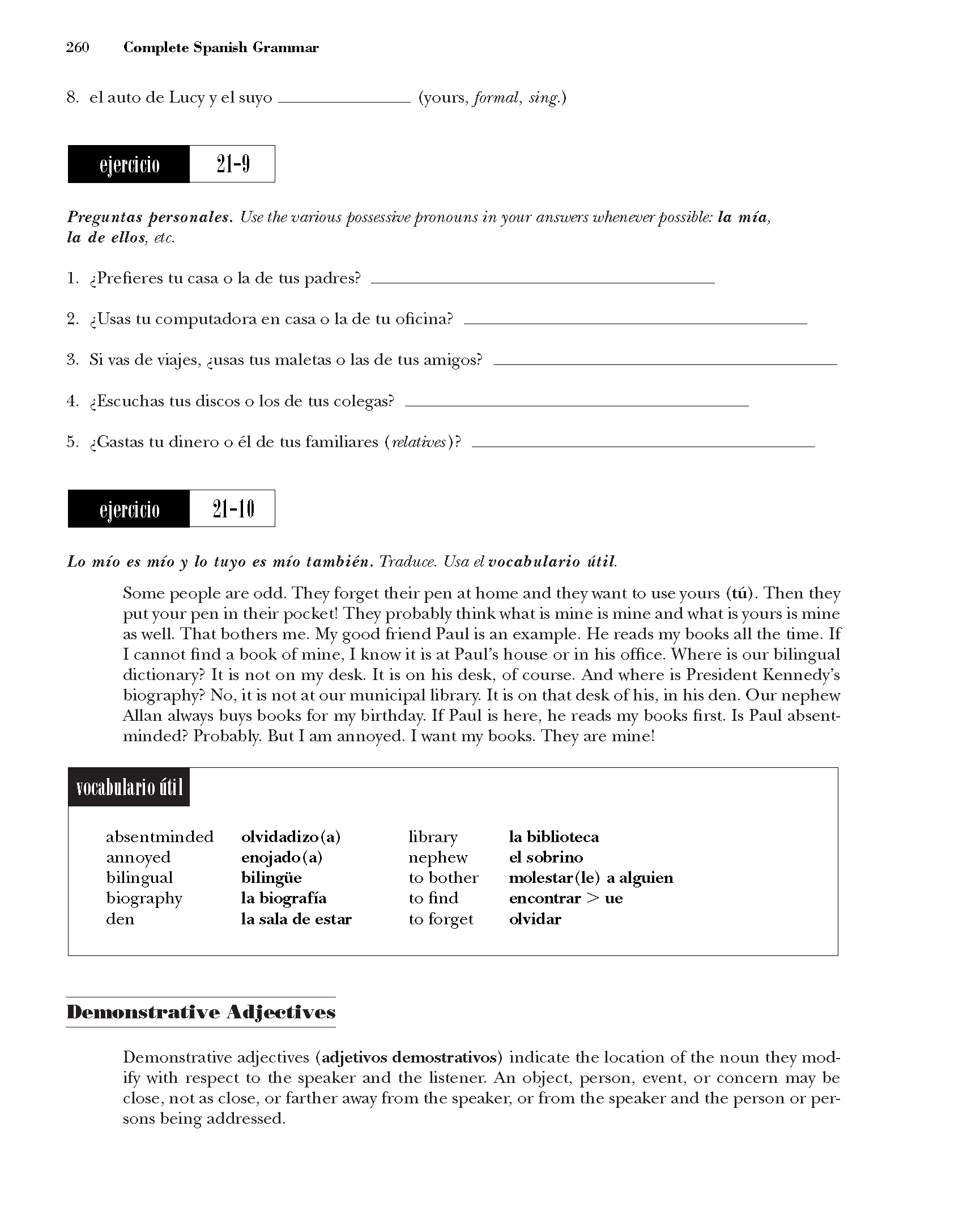CSG271

260 Complete Spanish Grammar
8. el auto de Lucy y el suyo_ (yours, formal, sing.)
ejercicio
Preguntas personales. Use the various po.sses.sivepronouns inyour answers wheneoerpossible: la mia, la de ellos, etc.
1. ^Prefieres tu casa o la de tus padres? _
2. ^Usas tu computadora en casa o la de tu oficina? _
3. Si vas de viajes, ^usas tus maletas o las de tus amigos? _
4. ^ Esc uch as tus discos o los de tus colegas? _
5. ^Gastas tu dinero o el de tus familiares (relatives)? _
21-10
ejercicio
Lo tnto es tnto y lo tuyo es tnto tambien. Traduce. Usa el vocabulario util.
Some people are odd. They forget their pen at home and they want to use yours (tu). Then they put your pen in their pocket! They probably think what is minę is minę and what is yours is minę as well. That bothers me. My good friend Paul is an example. He reads my books all the time. If I cannot find a book of minę, I know it is at PauPs house or in his office. Where is our bilingual dictionary? It is not on my desk. It is on his desk, of course. And where is President Kennedy’s biography? No, it is not at our municipal library. It is on that desk of his, in his den. Our nephew Allan always buys books for my birthday. If Paul is here, he reads my books first. Is Paul absent-minded? Probably. But I am annoyed. I want my books. They are minę!
library nephew to bother to find to forget
la biblioteca el sobrino
molestar(le) a alguien encontrar > ue olvidar
absentminded
annoyed
bilingual
biography
den
olvidadizo(a) enojado(a) bilingue la biografia la sala de estar
Demonstrative Adjeetives
Demonstrative adjectives (adjetivos demostrativos) indicate the location of the noun they mod-ify with respect to the speaker and the listener. An object, person, event, or concern may be close, not as close, or farther away from the speaker, or from the speaker and the person or per-sons being addressed.
Wyszukiwarka
Podobne podstrony:
CSG293 282 Complete Spanish Grammarejercicio l Que clase de relación existe entre los elementos de l
CSG051 40 Complete Spanish Grammarejercicio El sabado Marta estuvo muy ocupada. Entreparentesis, sub
CSG123 112 Complete Spanish Grammarejercicio Un poco de historia. Escribesi es verdadero (V) o falso
CSG177 166 Complete Spanish Grammarejercicio Un poco de lógica. Laura preparó su boda. Escoge la let
CSG293 282 Complete Spanish Grammarejercicio l Que clase de relación existe entre los elementos de l
CSG027 16 Complete Spanish Grammar hacer el papel de to play the role of El actor hace el papel de H
CSG149 138 Complete Spanish Grammarejercicio Decide. iEl presente de indicativo o el presente de sub
CSG303 292 Complete Spanish Grammar 6. Los chicos insisten (por
więcej podobnych podstron